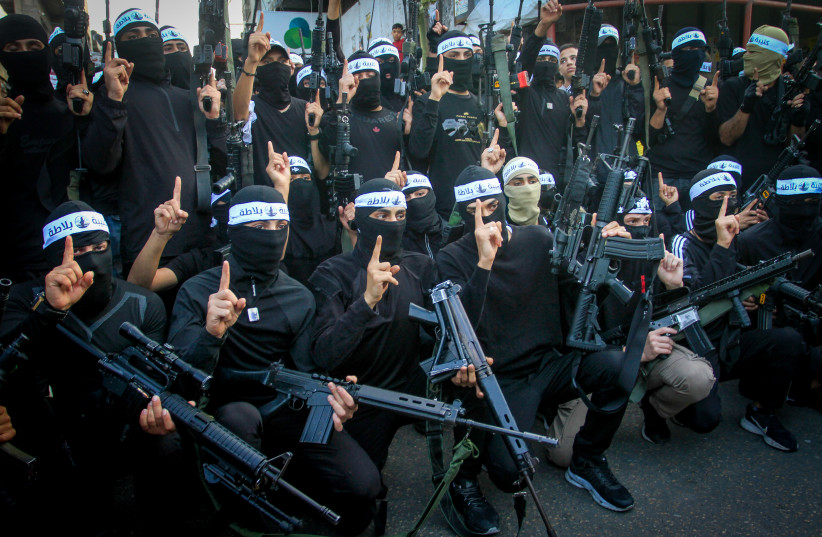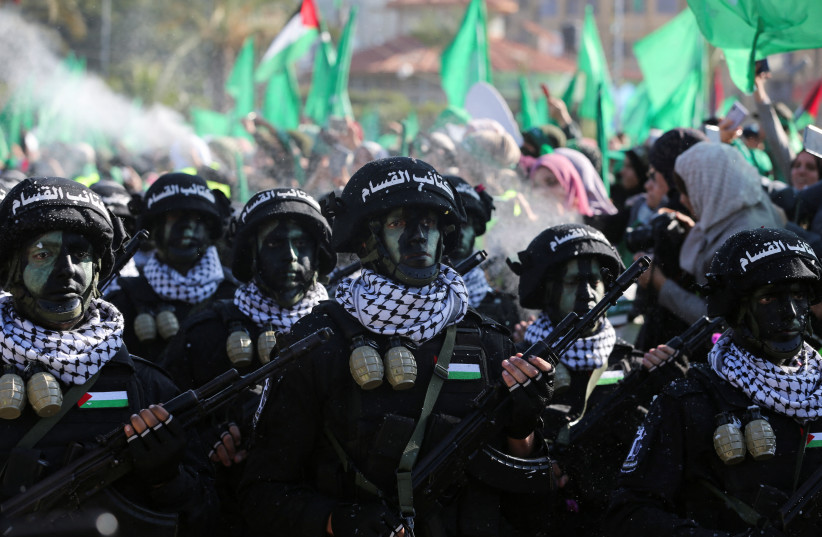Hundreds of gunmen belonging to the ruling Fatah faction took to the streets in several parts of the West Bank over the weekend, in one of the largest shows of force by Fatah there in recent years, firing into the air and chanting slogans in support of Palestinian Authority President Mahmoud Abbas, amid heightened tensions with Hamas.
The tensions reached their peak last week, when two senior Fatah officials, Mahmoud al-Aloul and Azzam al-Ahmed, were expelled from the funerals of some of the Palestinians killed during the recent Israeli military operation in Jenin Refugee Camp.
The expulsion of the two officials sparked angry reactions from several Fatah representatives, including the faction’s armed wing, Aqsa Martyrs Brigades.
Did Hamas contribute to the expulsion of Fatah officials from recent funerals?
Fatah accused Hamas members of standing behind the humiliation of Aloul and Ahmed at the funerals and vowed to severely punish those responsible. It called on the PA security forces, largely dominated by Fatah, to “break the bones and cut off the tongues” of Hamas men in the West Bank.
On Friday night, a top adviser to Abbas lashed out at Hamas, dubbing it a “gang of thieves, liars, and spies” whose leaders lead comfortable lives in five-star hotels in Qatar while their people are suffering in the Gaza Strip.

Senior Fatah officials also accused Hamas of attempting to “hijack the victory” the Palestinian gunmen allegedly scored during last week’s two-day military operation in Jenin Refugee Camp.
The Palestinians see the results of the operation as a “victory,” because the Israeli security forces were unable to kill or capture most of the top gunmen, including the commanders of the Jenin Battalion, a militia armed and funded by the Iranian-backed Palestinian Islamic Jihad (PIJ).
Twelve Palestinian gunmen were killed during the operation, according to Palestinian sources. The slain gunmen were members of the Jenin Battalion and PIJ, the sources said.
“Hamas was out of the picture during the Jenin battle,” said Hafez Barghouti, a former newspaper editor and member of Fatah’s Revolutionary Council. “Despite that, Hamas told the world that it was present during the battle.”
Hamas and other Palestinians, however, ridiculed the Palestinian security forces for hiding in their headquarters in the city of Jenin during the Israeli military incursion. Some went so far as to accuse the PA leadership of being in cahoots with Israel to get rid of the armed groups in Jenin Refugee Camp.
In an apparent response to the Fatah allegations, the armed wing of Hamas has begun taking credit for terror attacks against Israelis, especially in the West Bank. The goal: to show that Hamas is not sitting on the fence and is actively taking part in attacks against Israelis.
Aloul and Ahmed were forced to leave the funerals when several angry mourners shouted at them “bara, bara! (Go away, go away) and ya lil’ar! (shame) and accused the PA of failing to defend the Palestinians during the military operation.
How are Fatah activists explaining funeral incidents?
Attempts by Fatah activists to explain to the crowd that Aloul, deputy chairman of Fatah, is a father of a “martyr” because his son was killed by Israeli troops at the beginning of the Second Intifada, fell on deaf ears. Aloul, also known as Abu Jihad, is a veteran Fatah leader whose name is often mentioned as a potential successor to the 87-year-old Abbas.
The incident at the funerals is seen as a huge embarrassment for Fatah and as yet another sign of mounting tension between the ruling faction and Hamas. The two parties have been at each other’s throats since 2007, when Hamas staged a violent coup against the PA and seized control of the entire Gaza Strip.

Some Palestinian officials in Ramallah are convinced that Hamas, with the help of Iran, is seeking to extend its control to the West Bank. The officials have also expressed deep concern over PIJ’s rising power in the northern West Bank, specifically Jenin and Nablus.
Shortly after the incident at the funerals, masked Fatah gunmen raided several shops owned by Hamas supporters in Nablus and Hebron and ordered them to close their businesses.
In a series of statements posted on social media, Fatah-affiliated groups and individuals condemned Hamas as a “puppet” in the hands of Iran and called for preventing it from operating in the West Bank.
“Hamas is a mercenary group serving the agenda of foreign parties,” said a Fatah official. “Hamas has always been acting against the higher national interests of the Palestinian people. Hamas wants to create a separate Palestinian state in the Gaza Strip – with the blessing of Israel and the US.”
Tawfik Tirawi, member of the Fatah Central Committee and a former head of the PA’s General Intelligence Service in the West Bank, called on the Aqsa Martyrs Brigades gang “to rise and protect your leaders and security forces.” The call came in response to the expulsion of Aloul and Ahmed from the funerals.
A Hamas activist described Tirawi’s call as a “declaration of war” on Hamas and other Palestinian “resistance” groups. The activist and other Palestinians said many of the gunmen who marched on the streets of Palestinian cities and villages were actually officers belonging to the Preventive Security Service and General Intelligence Service.
After the appeal, the Aqsa Martyrs Brigades announced that its men have been placed on high alert in many parts of the West Bank.
Commenting on the appearance of Fatah gunmen on the streets, a Palestinian political activist asked: “How come we never see these gunmen when the Israeli army invades Palestinian cities and refugee camps? Why do they always appear in public to threaten and intimidate Palestinians?”
In a face-saving act on Saturday, Aloul and a number of top Fatah officials, including Rawhi Fattouh, chairman of the the PLO’s legislative body, the Palestinian National Council, returned to Jenin Refugee Camp as guests of the Jenin Battalion and Aqsa Martyrs Brigades.
One of the gunmen assured the Fatah delegation: “Our only goal is to fight the Jews. Our rifles were never involved in [internal] political issues.”
